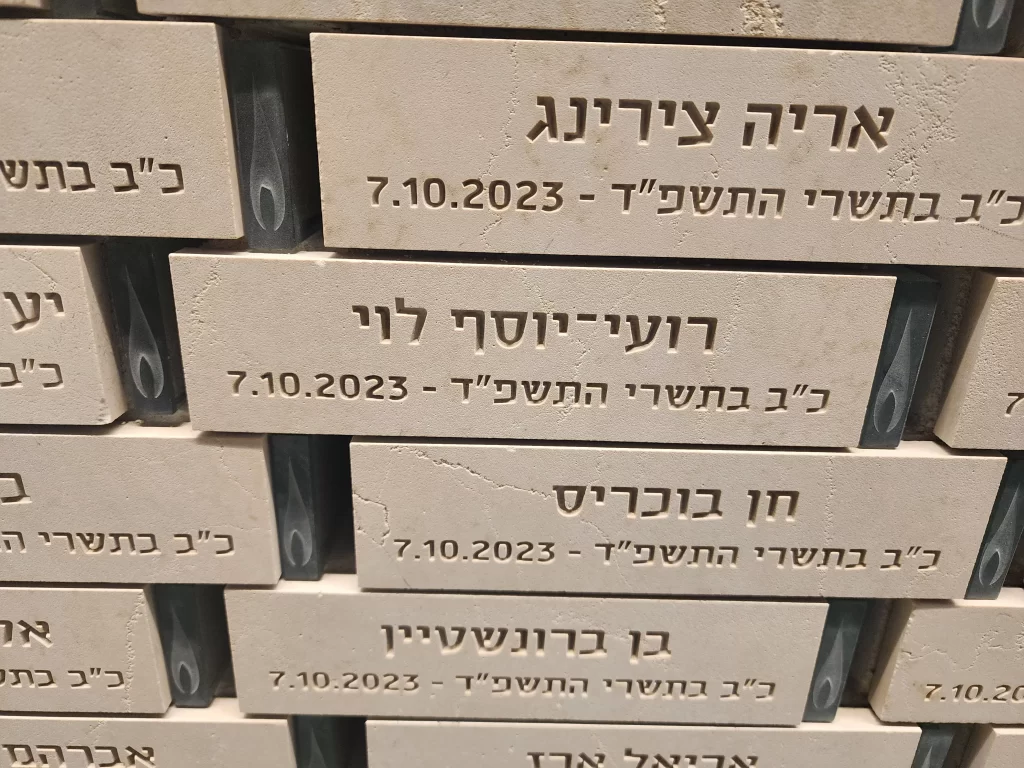Published on facebook, 16 December 2023.
This week, we continue to bear the heavy price required to safeguard the well-being of our Jewish and Democratic State. Our soldiers, sons and daughters, husbands and wives, partners, relatives, and friends, are actively engaged in the Gaza Strip, confronting an adversary bent on our destruction. The toll exacted upon us is profound. Each fallen soldier, each injured warrior, fractures our hearts into myriad pieces. The tales of heroism accompanying their sacrifices serve as beacons of light for our nation and the soldiers on the battlefield. These narratives affirm that they are undertaking a just mission, and we owe them an enduring debt of gratitude.
Since September 7, intellectuals, analysts, and virtually everyone has been emphasizing that the Jewish People and the State of Israel have not encountered a pogrom, massacre, of this magnitude since the Shoa, the Holocaust. This generation has seemingly taken Israel for granted, as the fourth generation is detached from the harsh realities that led to the establishment of the state. September 7 serves as a sobering reminder, bringing us back to day one—the recognition of the imperative for a robust and democratic Jewish State that can assert itself confidently.
Jewish values, timeless and handed down through generations, endure in our spirit and actions. They are not eroded by the passage of time but rather deepened and demonstrated in response to the emerging challenges of each new generation. The wisdom of the Rabbis is encapsulated in the teaching, “Moses and Aaron among His priests, and Samuel among those who call His name; they called upon the Lord, and He answered them” (Psalms 99:6). This imparts the lesson that even the most humble leader, once appointed over the community, must be revered as if the greatest, and all are obligated to respect and follow their decisions (B. Talmud Rosh Hashanah 25b). Today’s commanders in the field are equally great with the same reverence as the leaders of any preceding generation.
Leaders and commanders lead by example, guiding us from the forefront. Their authority is not based on dictatorship but on values such as professionalism, camaraderie, and compassion. In the instance where Moses is informed of the end of his days and the need for a successor, the criteria are clear: “who may go out before them, and who may come in before them, and who may lead them out, and who may bring them in; that the congregation of the LORD be not as sheep which have no shepherd” (Numbers 27:15-17). Joshua is identified as the fitting successor. Similarly, when Gideon, the Judge, leads his men into battle against Midian, Amalek, and all the Kedemites, he commands them with the directive, ‘Look on me, and do likewise’ (Judges 7:17), exemplifying leadership through action.
In the 1948 War of Independence, the Jewish people rallied to secure the establishment of the State of Israel, drawing strength from our traditions and spirit. Among the numerous battles, the struggle for control over the road to Jerusalem marked one of the most challenging episodes, with the Kastel standing out. In the midst of this intense battle, Shimon Alfassi, a Palmach commander, issued a crucial command: “Commanders will stay and cover their soldiers’ retreat.”
Yoram Kaniuk, an Israeli author and Palmach fighter who actively participated in this battle, vividly depicted the scene in his book. He wrote, “The officers commanded by Nahum Arieli stood like a human avenue on both sides of the path, between charred buildings and amid an inferno of firing, and we passed between them as if on our way to the wedding canopy. Slowly, one after the other, they were hit and fell, and those left standing continued to cover us while simultaneously engaging the attacker, but also succumbing to the fight. With one eye, I can see them shielding me as they fall like dominoes, and I want to fire, but I’m out of ammunition” (Yoram Kaniuk in his book תש”ח 1948).
The essence of this value is known as “Acharai – follow me.” It transcends being a mere command; it embodies a profound conviction. Commanders exemplify this principle by leading through personal example. Soldiers, in turn, follow with trust, admiration, discipline, and love.
This ethos is encapsulated within the Spirit of the IDF through two core values. While words carry significant weight, they are inherently limited, capable only of capturing a fraction of the values and spirit of a people. The true essence of these principles can only be fully comprehended by those directly experiencing them in the field.
Personal Example – The IDF servicemen and women will comport themselves as required of them, and will demand of themselves as they demand of others, out of recognition of their ability and responsibility within the military and without to serve as a deserving role model. (From The IDF Spirit)
Comradeship – The IDF servicemen and women will act out of fraternity and devotion to their comrades, and will always go to their assistance when they need their help or depend on them, despite any danger or difficulty, even to the point of risking their lives. (From The IDF Spirit)
In this just war, we mourn the loss of too many soldiers, including many commanders who led their troops in battle. Among those who sacrificed their lives in the recent engagement in Shejaiyah are Maj. Roei Meldasi, Lt. Col. Tomer Grinberg (commander of Golani’s 13th battalion), Sgt. Achia Daskal, Maj. Moshe Avram Bar On, Cpt. Liel Hayo, Staff Sgt. Oriya Yaakov, Sgt. First Class Rom Hecht, Mag. Ben Shelly, Sgt. Eran Aloni, and Col. Itzhak Ben Basat. These individuals were the epitome of excellence, representing the very best among us, the salt of the earth.
I find myself continually reflecting on the leadership demonstrated by commanders such as my classmate Col. Roi Levy, along with many others who have been lost in the course of this war. Personally witnessing their camaraderie and leading by example in the field has solidified my unwavering confidence in our military leadership. Furthermore, I harbor complete trust in the soldiers who have tragically lost their commanders and leaders. The spirit of Israel endures, passed down from one generation to the next, as the baton is seamlessly handed over. Soldiers are stepping up, and leadership positions are promptly filled. Some might describe this as amazing or outstanding; I would simply affirm that this is the indomitable Spirit of Israel. And yes, it is truly amazing.
To those who believe that this generation has lost sight of its origins, I would like to invoke a quote from Yigael Yadin regarding the generation of fighters in 1948—I wholeheartedly endorse every sentiment expressed, finding it equally applicable to this generation.
“נוער זה כאילו אגר בתוכו מלוא כמיהת עם ישראל באלפיים שנות גלותו לשוב לאדמתו ולחיות חיי חופש ועצמאות, ובדומה לקפיץ ענק, שנדרך וכווץ זמן רב עד קצה גבול יכולת מתיחתו, שוחרר לפתע – ושיחרר” (יגאל ידין הרמטכ”ל השני של צה”ל)
If we are to condense all the various factors, and there are many, which brought about victory, I would not hesitate to credit the extraordinary qualities of Israel’s youth, during the War of Independence with that victory. It appears as if that youth has absorbed into itself the full measure of Israel’s yearning, during thousands of years of exile, to return to its soil and to live in liberty and independence, and like a giant spring which had been compressed and held down for a long time to the utmost measure of its compressibility, when suddenly released — it liberated. (Yigael Yadin, Israel’s first Chief of Staff).
Ben Gurion delivered a notable speech on July 2, 1963, upon departing from the position of Minister of Defense. His renowned line continues to resonate powerfully:
“Each Jewish mother should know that she has entrusted the lives of her sons to the hand of commanders worthy of that trust.”
The enduring Spirit of Israel remains alive in the hearts of every soldier and commander within the IDF. My heartfelt prayers go out for the safety and sound return, both in body and spirit, of our commanders and soldiers. I have trust in you!!




